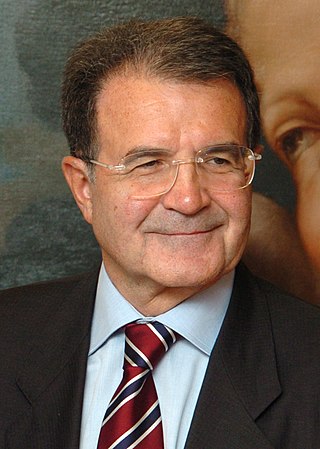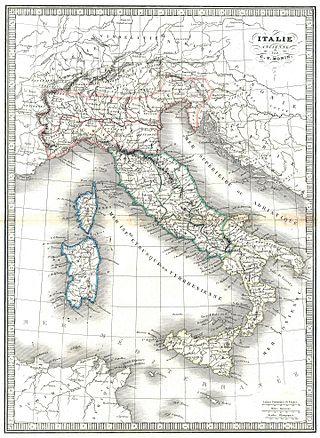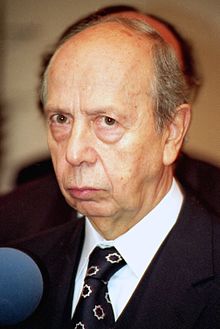
The politics of Italy are conducted through a parliamentary republic with a multi-party system. Italy has been a democratic republic since 2 June 1946, when the monarchy was abolished by popular referendum and a constituent assembly, formed by the representatives of all the anti-fascist forces that contributed to the defeat of Nazi and Fascist forces during the liberation of Italy, was elected to draft a constitution, which was promulgated on 1 January 1948.

Silvio Berlusconi was an Italian media tycoon and politician who served as the prime minister of Italy in four governments from 1994 to 1995, 2001 to 2006 and 2008 to 2011. He was a member of the Chamber of Deputies from 1994 to 2013; a member of the Senate of the Republic from 2022 until his death in 2023, and previously from March to November 2013; and a member of the European Parliament (MEP) from 2019 to 2022, and previously from 1999 to 2001. With a net worth of US$6.8 billion as of June 2023, Berlusconi was the third-wealthiest person in Italy at the time of his death.

Romano Prodi is an Italian politician who served as President of the European Commission from 1999 to 2004 and twice as Prime Minister of Italy, from 1996 to 1998, and again from 2006 to 2008. Prodi is considered the founder of the Italian centre-left and one of the most prominent figures of the Second Republic. He is often nicknamed Il Professore due to his academic career.

Forza Italia was a centre-right liberal-conservative political party in Italy, with Christian democratic, liberal, social democratic and populist tendencies. It was founded by Silvio Berlusconi, who served as Prime Minister of Italy four times.

The Union of the Centre, whose complete name is "Union of Christian and Centre Democrats", is a Christian-democratic political party in Italy.

The history of the Italian Republic concerns the events relating to the history of Italy that have occurred since 1946, when Italy became a republic after the 1946 Italian institutional referendum. The Italian republican history is generally divided into two phases, the First and Second Republic.

The 2006 Italian general election was held on 9 and 10 April 2006. Romano Prodi, leader of the centre-left coalition The Union, narrowly defeated the incumbent Prime Minister Silvio Berlusconi, leader of the centre-right coalition House of Freedoms. Initial exit polls suggested a victory for Prodi, but the results narrowed as the count progressed. On 11 April 2006, Prodi declared victory; Berlusconi never conceded defeat and an ensuing dispute formed.

Enrico Letta is an Italian politician who served as Prime Minister of Italy from April 2013 to February 2014, leading a grand coalition of centre-left and centre-right parties. He was the leader of the Democratic Party (PD) from March 2021 to March 2023.

The Union was a heterogenous centre-left political and electoral alliance of political parties in Italy. The Union was the direct heir of The Olive Tree coalition which represented the centre-left in the 1996 and 2001 general elections. However, The Union also included parties of the radical left, which were not affiliated with The Olive Tree. The Union was led by Romano Prodi, Prime Minister of Italy from May 2006 to May 2008, and former President of the European Commission. Collapsing in the wake of the 2008 Italian political crisis, the alliance was succeeded by the current-day centre-left coalition.

Pier Ferdinando Casini is an Italian politician. He served as President of the Chamber of Deputies from 2001 to 2006.

The Democratic Party of the Left was a democratic-socialist and social-democratic political party in Italy. Founded in February 1991 as the post-communist evolution of the Italian Communist Party, the party was the largest in the Alliance of Progressives and The Olive Tree coalitions. In February 1998, the party merged with minor parties to form Democrats of the Left. At its peak in 1991, the party had a membership of 989,708; by 1998, it was reduced to 613,412.

The 1996 Italian general election was held on 21 April 1996 to elect members of the Chamber of Deputies and the Senate of the Republic. Romano Prodi, leader of the centre-left The Olive Tree, won the election, narrowly defeating Silvio Berlusconi, who led the centre-right Pole for Freedoms.

Italian Renewal was a centrist and liberal political party in Italy.

The second Prodi government was the cabinet of the government of Italy from 17 May 2006 to 8 May 2008, a total of 722 days, or 1 year, 11 months and 21 days. The 59th cabinet of the Italian Republic, it was the only cabinet of the XV Legislature.

The third Berlusconi government was the cabinet of the government of Italy from 23 April 2005 to 17 May 2006. It was the 58th cabinet of the Italian Republic, and the second cabinet of the XIV Legislature.

The Liberal Democrats, whose complete name is Liberal Democrats for Renewal, is a liberal and centrist political party in Italy.

The political career of Silvio Berlusconi (1994–2011) began in 1994, when Berlusconi entered politics for the first time serving intermittent terms as Prime Minister of Italy from 1994 to 1995, 2001 to 2006 and 2008 to 2011, his career was racked with controversies and trials; amongst these was his failure to honour his promise to sell his personal assets in Mediaset, the largest television broadcaster network in Italy, in order to dispel any perceived conflicts of interest.

The Pole for Freedoms was a centre-right political and electoral alliance in Italy, which was active from 1996 to 2000. It included Forza Italia (FI), the National Alliance (AN), Union of the Centre (UdC), Christian Democratic Centre (CCD), United Christian Democrats (CDD), and Pannella–Sgarbi List.

Antonio Maccanico was an Italian constitutional specialist and politician who served in various capacities in the Italian Parliament and federal administrations of Italy. He was the former general secretary of the Quirinal Palace from 1978 to 1987, and was several times minister and undersecretary to the Prime Minister under Carlo Azeglio Ciampi. He was also president of Mediobanca.
The centre-left coalition is a political alliance of political parties in Italy active under several forms and names since 1995, when The Olive Tree was formed under the leadership of Romano Prodi. The centre-left coalition has ruled the country for more than fifteen years between 1996 and 2021; to do so, it had mostly to rely on a big tent that went from the more radical left-wing, which had more weight between 1996 and 2008, to the political centre, which had more weight during the 2010s, and its main parties were also part of grand coalitions and national unity governments.























